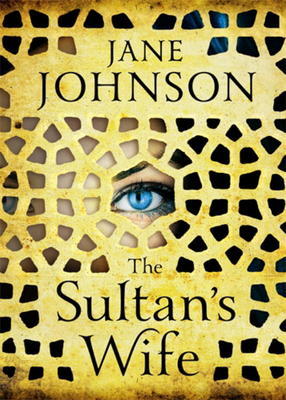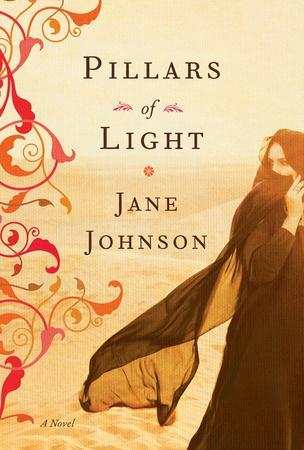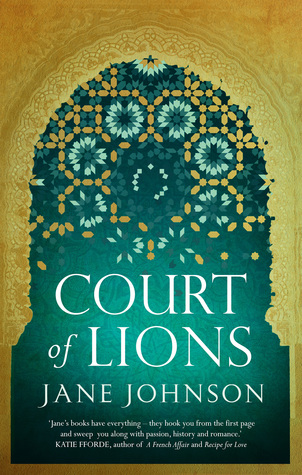Author Spotlight: Jane Johnson
Joining us for today’s Author Spotlight is Jane Johnson!
Jane is from Cornwall and has worked in the book industry for 20 years, as a bookseller, publisher and writer. She was responsible for publishing the works of J R R Tolkien during the 1980s and 1990s and worked on Peter Jackson’s Lord of the Rings movie trilogy, spending many months in New Zealand with cast and crew. Under the pseudonym of Jude Fisher she wrote three bestselling Visual Companions to the films. She has also written several books for children.
In 2005 she was in Morocco researching the story of a distant family member who was abducted from a Cornish church in 1625 by Barbary pirates and sold into slavery in North Africa (which formed the basis for Crossed Bones / The Tenth Gift), when a near-fatal climbing incident caused her to rethink her future.
She returned home, gave up her office job in London, sold her flat and shipped the contents to Morocco. In October she married her own ‘Berber pirate’ and now they split their time between Cornwall and a village in the Anti-Atlas Mountains.
She still works, remotely, as Fiction Publishing Director for HarperCollins.
Thanks for joining us, Jane. Let’s start small: tell us about a great book you’ve read recently!
First, I have to say I get very little time for reading for my own pleasure, and when I do I tend to go as far away from fantasy or sf as I can. So the book I treated myself to – so to speak – over Christmas was Adam Kay’s memoir about his time as a junior doctor: THIS IS GOING TO HURT. It’s painfully, laugh-out-loud funny and outrageous, tragic and deeply political by turns, and you finish it with utter sympathy for all those NHS workers killing themselves (often literally) in the service of our underfunded and ailing health service. It’s a brilliant read.
Okay, time to escalate things: reality warps and you suddenly find yourself leading a D&D-style party through a monster-infested dungeon. What character class are you, and what’s your weapon of choice?
Oh lord – here’s where I lose my fantasy master points: I have never in my life played D&D – it rather came after my time, in the circles I moved in at least, and the only video game I ever played was original DOOM (which, oh how I loved). Give me the freedom to choose my arena and style, though, and I’ll be a Viking shieldmaiden, but armed with magical explosive devices. Death at a distance please, and a chance to run away, discretion being the better part of valour and all that…
Indeed! When you’re not trawling through dungeons with your Viking explosives, do you prefer to type or to hand-write? Why?
I tend to write my first drafts longhand in the outdoors (weather permitting) where I can feel my imagination expand into the space available, and am not distracted by the internet or the constant, constant emails – even if I have an Out of Office on everyone still emails expecting an answer: it’s very wearing. There is good evidence for longhand plein-air writing being both freeing and good for the psyche, releasing theta-waves. I wrote a blog about it on my website last May. I should add that I’m also a terrible typist so get distracted by my billion typos: plus, having the chance to hone and polish as you type up the written draft is a good editorial exercise.
And how do you like to work – in silence, with music, or serenaded by the damned souls of a thousand dead shrimps?
If the work is flowing nothing else registers – I can tune out just about anything. I’ve worked in airports, on trains, planes, sitting on a wall waiting for a bus, in busy cafes, all over the place. If the wretched thing isn’t flowing I can’t write anywhere – or at least anything worth keeping. However – and this is hard-won advice – I have learned that it’s better to write rubbish and then discard it than not to write at all. Just the habit of writing and realising that everything is fixable is key.
Are you an architect or a gardener? A plotter or a pantser? D’you write in your underwear, or in a deep-sea diver’s suit? Tell us something unusual about your writing method!
Whatever anyone says, I’m pretty sure every writer is a bit of both. I wish I could be more architect than gardener but my brain refuses to play ball. I always make sure I have some idea of a structure and a strong ending before I start a book, but I do like to wander at will sometimes and see where the writing brain takes me: that’s how you get unexpected connections and take yourself by surprise, which is the thing I love most when writing. You know if you’ve surprised yourself, you’ll surprise the readers. I also love holding a secret up my sleeve till the end and then letting it explode out. It’s huge fun knowing that you can make readers gasp.
What are your most significant non-book fantasy influences?
If I were being pedantic (and I can be) I’d say all those fabulous story-cycles that would have been told by travelling storytellers around the fire, and kept alive orally before being written down – the old myths and legends of our world. But I did come to them in written form, so if I’m forced to look elsewhere it has to be film, though I can’t say that any film has ever inspired me to write. I do have favourites though that have meant a lot in different ways at different times in my life – everything from the early Disney Sleeping Beauty (loved that Wicked Queen!) and Chitty Chitty Bang Bang to Watership Down, Incredible Journey, Ring of Bright Water, Star Wars, and of course Peter Jackson’s Lord of the Rings trilogy.
McMafia last night – I read the original nonfiction book it was based on when I toured THE SULTAN’S WIFE in Canada and found myself one night on the same bill as Misha Glenna, the author. I bet he never expected to see it dramatised in such a way, with James Norton in a starring role: it’s a veery gritty dissection of the way corrupt billions circulate around the world, something we’re starting to understand better after the Paradise Papers scandal!
The world shifts, and you find yourself with an extra day on your hands during which you’re not allowed to write or otherwise do any work. How do you choose to spend the day?
Oh, what a rare luxury! If it’s good weather I’d choose to walk in whatever wilds are at hand, taking photos and getting lost in the landscape. If it’s pouring though, I’ll put my feet up and binge-watch a Netflix series. I’m a sucker for a complex, involving crime series – I adored The Wire, Breaking Bad and Mindhunter and true crime series like The Keepers and The Making of a Murderer. Such insights into the darkness of the human psyche: that’s useful research for any kind of fiction.
If you could choose one punctuation mark to be made illegal, which would it be and why?
I use it a lot in emails and informal correspondence – but in novels, the exclamation mark, without a doubt. You can manage tone with the words alone.
In no more than three sentences, tell us a little something about your current work in progress!
Well, that’s hard because I have two and I’m not sure which one’s going to fly. One is set in Cornwall and is more modern than my usual historical fiction; the other takes a character from COURT OF LIONS – the Trickster figure, Blessings and sends him off on (disastrous) adventures with Christopher Columbus and then to the dangerous English court.
If you could co-write or co-create a series (like The Expanse, or the Malazan Book of the Fallen), who would you choose to work with and why?
With Mark Lawrence – our writing brains seem to have a lot of crossover, and I can go just as dark as he can, and he has a lightness of touch and clarity in his writing that would challenge me to strive for the best I can manage.
What’s the most (and/or least) helpful piece of writing advice you’ve ever received?
Megan Lindholm (Robin Hobb) once said to me that she dreams of being gifted stretches of boring, uneventful life, and it’s true: for a writer that’s just what you need. There’s nothing worse than your fertile writing time being suddenly curtailed – and I say that as someone for whom that is a constant problem, as I still work 4 days a week for HarperCollins.
If you could visit any country at any point in history, where/when would you go, and why?
Iceland just before the conversion to Christianity in the year 1000: I would love to see the Althing – the Icelandic gathering that served as a sort of parliament – in operation. There would be so many tales to hear about feuds and lawsuits, and the tensions between the ways of the old gods and the coming of the new would be fascinating. I studied Old Icelandic as part of my Master’s degree, so should be able to cope to some extent with the language!
Every writer encounters stumbling blocks, be it a difficult chapter, challenging subject matter or just starting a new project. How do you motivate yourself on days when you don’t want to write?
If I really can’t write, I walk, but always with a notebook: I find that gentle exercise jogs the brain to life.
Tell us about a book that’s excellent, but underappreciated or obscure.
I recommend everyone reads David Zindell’s phenomenal novel NEVERNESS. It’s a superb crossover of fantasy and sf and as epic as epic can be, poetic and violent and stirring and mind-blowing.
Finally, would you be so kind as to dazzle us with what we like to call a ‘shark elevator pitch’? (It’s exactly the same as an elevator pitch, but with sharks.) (Well, one shark. Which, by the way, is currently picking between its rows of teeth to try and dislodge the remains of the last author who stepped onto its elevator.)
Ahem. So: why should readers check out your work? A shark elevator pitch of your own book(s) in no more than three sentences – go!
I write stories that can encompass both the clash of civilisations and the mysteries of the human heart! I want to take readers on an epic journey that will plunge them into both terror and ecstasy, and leave them feeling wrung out and yet broken-hearted that the story has finished. My books usually involve real history, which I research thoroughly, but the most important aspect will always be the characters who tell the story: they should live on in your head even when the book is finished.
Jane Johnson is a historical fiction author. You can buy her books here.



